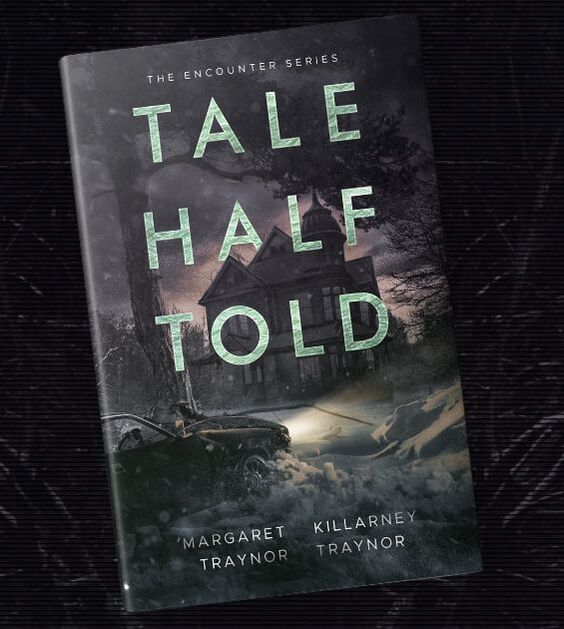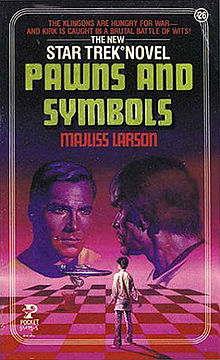 Synopsis: The Enterprise is called to Sherman's Planet, where agricultural scientist Jean Czerny is adapting a new quadrotriticale seed (The Trouble with Tribbles, anyone?). However, by the time they arrive, Jean has been taken captive by Commander Kang, a ruthless Klingon who will do anything to get the new seed to his starving worlds, including using force on the scientist. But Jean is not all that she seems and the situation is not a simple case of kidnapping. Jean is forced to live among the Klingons, working to end the famine that threatens their empire. But even as she adapts to her brutal new surroundings, new dangers and intrigues threaten to overwhelm her and her newly adopted mission of mercy. Will she ever see the Federation again? Pawns and Symbols is... frankly, a weird entry in the series. It reads more like a historical romance book than a Star Trek episode: an intelligent young woman is captured by a powerful, but still attractive half-savage and uses both her brains and her body to survive the encounter, learning, as she does, that the man and the culture are not quite as bad as she first thought. It reminded me a lot of the 1919 novel The Sheik, and that's no compliment. The Sheik, the story a man who captures and brutalizes a woman who eventually falls in love with him, was a sensation in it's time, spawning a popular movie and sequel. In Pawns, after his attempt to rape Jean is interrupted, Kang forces her into a sort of concubine role and she is used and abused throughout the rest of the book, beaten quite severely at times. I may be oversensitive, but I found this to be an uncomfortable read. Abusive characters like the Sheik and Kang are next to impossible to redeem and encouraging fantasies about them and excusing their behavior is a dangerous game to play. Anyhoo, preaching aside, Kirk and crew are hardly in the book at all, though they are well written when they appear (there's an odd episode with them in the middle book that seems more like a short story than a necessary part of the novel). The author goes into great detail about the Klingon Empire, but while she spends a lot of time on Jean and Kang, she leaves her other new characters short on personality and backstory. In sum, the book feels more like better-than-most fan-fiction written by a woman who had a lot of fantasies about Klingons (in particular, the commander from Day of the Dove) and probably should talk to someone about that. Not recommended: skip this and go see next week's theater showings of Wrath of Khan instead. Get Michael Lawrence while it's free!
0 Comments
by Tony Daniel 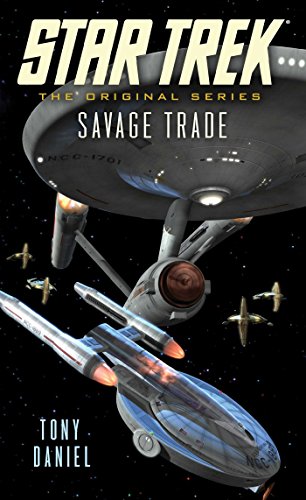 The USS Enterprise is assigned to Vara Nebula to discover why science outpost Zeta Gibraltar is not answering Federation hailing signals. What they find is a deserted post, no life forms, and signs that indicate a violent firefight. Impossible as it seems, it appears that the members of the science team have been kidnapped by pirates who deal in the slave trade: pirates that are supposed to have been completely dispersed decades ago. The Enterprise immediately goes off in pursuit.. and find not only the pirates and their kidnapped scientists... but Mr. President George Washington as well. This is only the beginning of a strange, twisting adventure that brings Captain Kirk and his intrepid crew face-to-face with some of the heroes and villains from their past. Savage Trade is one of the few Trek books to really surprise me: constantly moving, with plot twist after plot twist, it's one of the most fun of the books and definitely one of the closest to the feel of the original series. Daniel has done his research on the characters well and if the final act is a little less-than-original and if there are a few unnecessary scenes here and there, the book more than compensates in its cheer, pacing, and sheer reading enjoyment. Highly recommended. Character Ratings: Kirk, Sulu, and Chekov: A+ Spock, McCoy, and Scott: B+ Uhura: too little seen to judge 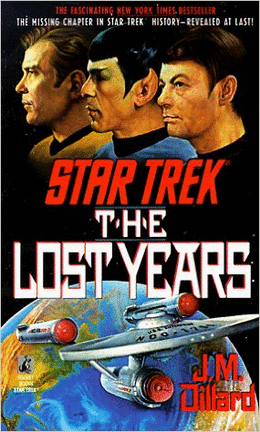 Their 5-year mission coming to an end, the intrepid crew of the Enterprise finds themselves scattered to the four winds. Captain Kirk finds himself without a ship and after a brief tussle with the admiralty, finds himself accepting a promotion and a diplomatic position within Star Fleet. This pleases neither Spock nor Dr. McCoy. Spock returns to Vulcan to accept a post in a university, while McCoy pursues an old flame. But as they struggle to adjust to planet-side life (and a life without one another), an ancient evil arises and unites with a current enemy. Soon the old friends will find themselves fighting not only to save each other - but the fate of the Federation of Planets as well. The Lost Years promises to fill the gap between the original TV show and the Star Trek: the Motion Picture. It may have more aptly been named The Lost, Rather Downer Year, as it barely covers one and what it does cover is rather depressing. JM Dillard skillfully works together multiple plot lines, so many and so varied that it isn't until the 3rd act that you can see how they work together. Kirk resigns himself to desk-work and diplomacy, a fate made easier by the fact that he is reunited with Riley (the loveable Irishman from Season 1) and his boss is a comely Admiral who isn't immune from his charms. Spock, disappointed that Kirk will not take another ship, resigns from Star Fleet and pursues a relationship himself. And Dr. McCoy, ever doomed to romantic disappointment and convinced that Kirk has been hoodwinked into his new position, is adrift and lost, though accompanied by a witty and bright scientist who is studying ancient religions. The other characters make brief appearances and everyone is well-shown, Dillard obviously being a fan of the show. But the whole book is so darned depressing. You wince as Kirk begins to make concessions, trimming his larger-than-life personality to fit behind behind the desk and into a career as a diplomatic problem-solver and we agree with McCoy when he accuses him of selling out to the higher-ups. McCoy is his sharp, tenacious self, but Spock is more than usually withdrawn and making his own concessions to the ordinary life. As is usual in friendships, their concessions affect their relationships, so much so that by the end of the book, you find yourself actually looking forward to The Motion Picture (now THAT is a sentence I'd never thought I'd write!) when some of this will be put right again. Summary: Stellar plotting, strong lines, good side-character (I'm still annoyed at Kirk's new commanding officer), but depressing overall feel. Character ratings: McCoy A++ Kirk and Spock: A Everyone else: too little seen to rate. 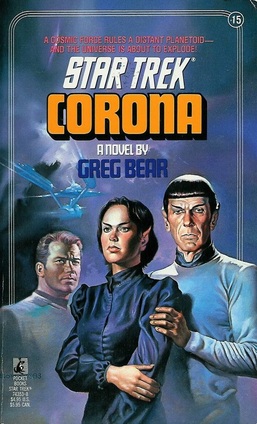 Summoned by a 10-year-old distress signal, the Enterprise rushes to the Black Box Nebula Station One to rescue a team of scientists lead by Spock's cousin, T'Prylla, and her family. Hampered by the presence of an inexperienced young reporter and a new computer system that has the power to over-ride Kirk's command, they arrive at Station One only to find that all seems well - on the surface. But T-Prylla, her family, and the team are being controlled by a sentient force - a force that threatens the entire Universe as we know it. Corona is not, alas, an illusion to alcohol, but the name of the sentient being that controls the hapless Vulcan scientists that Kirk and crew have come to save. A fast-paced novel with an intriguing sci-fi basis, this episode rushed along too quickly for me to really get into the story. This is really too bad, as there are several elements to the story which could have been drawn out and delved into. At 192 pages, it's not the shortest Star Trek book I've read, but it felt like it. The characters come off pretty well, with Bear's Kirk being more thoughtful and less gut-instinct than Shatner's. While entertaining and fun, Corona will not rock your world and adds nothing to the Star Trek universe. Rating: Meh Characters: Kirk and Spock - B McCoy and Uhura - B+ Checkov - B- Everyone else: too little seen to judge 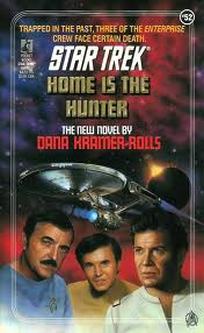 Captain Kirk and his intrepid crew are dispatched to the primitive planet of Cragon V to offer them Federation support, only to find that the Klingons have beaten him there. When a dispute between the Kligons and Federation landing party consisting of Kirk, Sulu, Scotty, and Chekov turns deadly, the mysterious and powerful leader of the planet condemns both parties to death. He renders the two ships helpless - and exiles Sulu, Scotty, and Chekov into the past. Scotty lands in 18th century Scotland and in the middle of Bonnie Prince Charlie's doomed revolt, Sulu in feudal Japan on the wrong side of a bloody power struggle, and Chekov in World War II Russia, where one wrong move can send you to Siberia - or worse. As the Enterprise slowly descends towards its destruction in the planet's gravitational pull, Kirk must discover how to save his ship and his men - before time runs out. Home is the Hunter is a pleasant outing that takes place right after Star Trek: the Motion Picture, when the crew is a little more seasoned. There's plenty of action in Sulu's Japan, where he is mistaken as a Samuri and falls in love with the wrong woman, while Chekov attempts not only to save himself, but also a man who could just be Captain Kirk's ancestor. Scotty contends not only with a country in revolt, but a memory loss. Captain Kirk, meantime, must work with the ousted captain of the Klingon ship to convince the planet's leader to restore their ships and crewmates. The author has a keen sense of humor and a light touch. This book doesn't do much to expand on or add to the Star Trek saga, but it's fun to see some of the more underused characters (Sulu, Scotty, and Chekov) have own adventures. Summary: A fast and fun read - well worth the effort. Character ratings: Kirk, Sulu, Chekov - A Scotty - B+ Spock, McCoy, Uhura - not used enough to tell 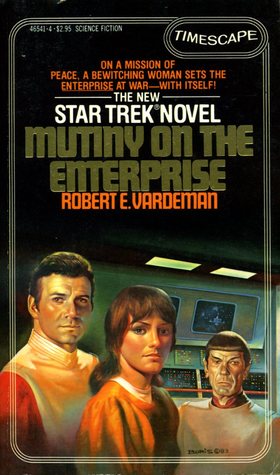 The Enterprise, long over-due for repair and relaxation, is unexpectedly sent on a mission to the fringe of the Federation world to deliver a diplomat intent on halting hostilities in two far worlds and preventing a Romulan take-over. Not only is the Enterprise under-powered and over-strained, but the diplomat's abrasive manner lends serious doubts to the efficacy of his mission. Things turn dangerous when Kirk rescues a stranded space-traveler - a woman who casts a curious spell of pacifism over his crew. Suddenly, Kirk is facing not only Romulans and hostile natives - but his own mutinous crew! Mutiny on the Enterprise is a good, solid addition to Star Trek. The characters are well portrayed, the pacing is good, and the story line feels like an episode for the original series. I loved the fact that, though Captain Kirk is never really fooled by the woman he's taken on board, he is nevertheless susceptible to her powers of argument - a touch of smart humanity that more careless writers wouldn't add. The only draw back (which isn't really a negative, so much as an observation) is that the author doesn't do much more with the story than present it. This is a fun adventure and not much more. The Star Trek morality-play hallmark is missing - or perhaps I just missed it. (Totally possible - I was overly charmed by the single-entity planet that Kirk and loyal crew are marooned on.) Summary: A good entry into the Star Trek series, with the cast and crew well represented. This book won't rock your world, but it's an enjoyable way to get your weekly Trek fix. Character ratings: All As and Bs. 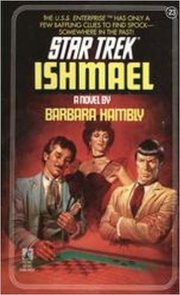 By Barbara Hambly Summary: While on a peaceful mission at Starbase 12, Spock uncovers a Klingon plot to destroy the Federation by going back in time to murder a man. But before he can relay the information to Kirk, Spock disappears along with the Klingon ship. Meanwhile, back in 1860s Seattle, Washington, Aaron Stemple comes across a strange man who has lost his memory - and may not be human. Stemple takes a huge risk by taking the man in as his nephew, Ishmael - little realizing that the danger comes, not from the alien, but from those seeking him. Can Kirk find Spock before the Klingons do? Ishmael is quite possibly the strangest crossover book in the history of Star Trek crossovers. Barbara Hambly takes advantage of the fact that Sarek was played by Mark Lenard, who also played Aaron Stemple in the romantic dramedy series, Here Comes the Brides. In Brides, Stemple is the somewhat unscrupulous businessman who puts up money for Jason Bolt's bridal scheme - with the proviso that, should any of the women go home before the year is up, Stemple will take over the considerable Bolt property. Hambly sets the story in season 1 of Brides, and changes the terms of the bet for her own purposes: in Ishmael, Bolt will lose the bet if any of the women remain un-betrothed by the end of the year. Ishmael has a lot of fun drawing Spock into Seattle's romantic intrigues, while still maintaining the tension of Kirk's desperate search for his missing first mate. The Trek cast are pretty strong, focusing, by necessity, on Spock, Kirk, and McCoy. The Brides' cast doesn't fare quite as well. While Stemple and singleton Biddy Cloomb get sympathetic treatment (especially Stemple, who is played as a misunderstood loner rather than the more acrimonious figure in the TV season one), the smooth-talking, charismatic Jason Bolt of the TV show suffers, coming across as a desperate schemer - a surprise, considering he's the hero of the show. One gets the impression that Hambly didn't like him very much, but perhaps she's approaching him from Stemple's POV. All in all, Ishmael is a thoroughly enjoyable piece of fan-fiction that seeks to answer some of the questions left open by the end of Brides and tie Spock more firmly to his human past. While sci-fi and action take a backseat to character and relationship building, this is a satisfying outing, especially to fans of both shows. Bonus: keep a sharp lookout. there are cameos from other TV shows, such Doctor Who and Bonanza, sprinkled liberally through out the book. Character ratings: Star Trek: all As and Bs. Here Come the Brides: Mostly Bs, except for Jason, a definite C. 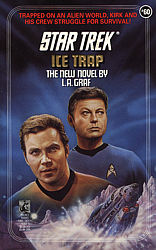 In Ice Trap, Captain Kirk and his crew are dispatched to icebound Nordstral to investigate a mysterious outbreak of insanity only to quickly discover that there is much more going on than they first supposed. A team of research scientists have already disappeared - and even the otherwise friendly natives have no clue about their whereabouts. While Kirk and McCoy take on the medical mystery, Uhura and Chekov lead a team composed of Enterprise crew and untrustworthy outsiders in the frozen tundra to find the scientists. But with the planet undergoing massive instability, both teams risk never coming back alive. LA Graf has a great sense of pacing and paints an impressive picture. The landscape is so barren and cold that I had to layer on extra sweaters just to get through some of the scenes. As it true with Star Trek books, the author (actually a pen name for two, possible three collaborators) gets most of the cast correct, but falls a little short on one. Chekov is so intense and rigidly capable in Ice Trap that he almost seems like a different character from the lovable TV version played by Walter Keonig. This is more than made up for by the attention paid to McCoy (whose childhood secret is revealed) and Uhura, who plays a meaty role in this outing. Summary: Ice Trap is a great book filled with thrills and chills - sorry, had to do that - and feels just like one of the original Star Trek movies (by which I mean the even ones, not the odd). Highly recommended. Character Ratings: Except for Chekov (who is an excellent character in this, but just didn't feel like the original), all As and Bs. 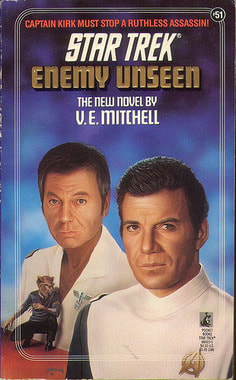 Captain Kirk and his crew (minus Spock, who is on leave) are assigned to a rather routine mission: transporting diplomats in the middle of tough negotiations. Things get tricky when one of the wives of the party is Kirk's old girlfriend - who would like nothing better than to renew the acquaintance (wink wink) -, while another diplomat insists on gifting Kirk three wives. Just when things couldn't get more awkward, an attache is murdered and the prime suspect is one of Kirk's own crew. A rather dull outing, lightened with occasional humor, but most of the action is focused on a unusually dithering Kirk, confounded by the rather simple murder situation. This might be explained by the fact that the book was originally written during the Enterprise's first five year mission and was rewritten to be set after the first movie, but a weak plot is still a weak plot. The answer to the mystery is so obvious, especially to a crew with the Enterprise's experience, that I found myself shouting, "It's a blood shape shifter, you meatheads! Not like you haven't seen that before!" and wishing that Mr. Spock would just come back already. Summary: Weak plot, poorly constructed mystery, but good prose. If you'd only time for one quick read, skip this and go for Prime Directive or Yesterday's Son. Character ratings: Voices (inflections, etc) all Bs. Actions and motivations, all Cs. |
The BlogWelcome to Categories
All
|
Copyright © Killarney Traynor
All Rights Reserved.
No part of this website may be reproduced without
the Owner's express consent. [Backlinks allowed.]
All Rights Reserved.
No part of this website may be reproduced without
the Owner's express consent. [Backlinks allowed.]


